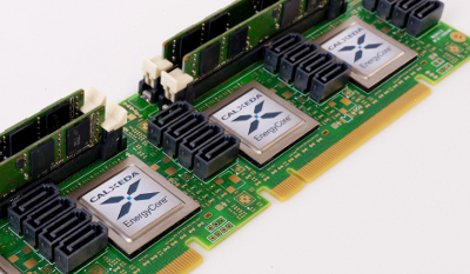Calxeda, the start-up making ARM-based servers which closed a year ago, is back - sort of. A Taiwanese games company has bought its intellectual property (IP) and will use it to build low-power compute and storage servers manufactured by FoxConn.
AtGames Digital Media of Taipei has set up a new company, Silver Lining Systems (SLS), which will sell compute and storage servers designed for data centers, big data applications and cloud businesses. AtGames, a Calxeda customer bought the IP to keep the server technology going, after Calxeda abruptly ran out of money in December 2013.
Although Calxeda failed, there is a still a growing opportunity for low-power servers in scale-out data centers, AtGames believes, and has teamed with partners incoluding Taiwan's manufacturing giant FoxConn to offer a Calxeda-based line.
Silver Lining for Calxeda cloud?
Silver Lining gives few product details, but promises a full rack of its A300 series servers will operate on less than 10kW. The servers will fit in a 2U chassis which will hold 48 modules, connected in a micro-cluster using a 10G low-latency fabric, so a 42U rack should hold more than 1000 servers (low power system-on-a-chip based servers use around 6W, so that checks out.
SLS says its servers will offer "high density, scalability, distributed cluster-computing, fault-tolerance/redundancy, graceful degradation, and low power". The company doesn't give any details of its planned storage servers.
The products are aimed at "data centers, CDNs [content delivery networks], media & entertainment, Internet, academic, and big data analytic environments".
The ARMs race
In recent years, several vendors have proposed server chips based on designs from UK-based ARM, whose designs already power the majority of smartphones and tablets. In servers, these could use lower power and break Intel's stranglehold on the market.
In practice, the market has developed more slowly than had been hoped. Although Calxeda was a leader, it ran out of money, partly because a deal to put the chips in HP's low-power Moonshot designs fell through, and Moonshot was first launched with Intel chips.
Since Calxeda closed its doors, the ARM chips movement has continued to move, with startup Cavium hiring Calxeda co-founder Larry Wikelius tro drive its own efforts. and AMD offering ARM servers alongside the Intel based products in it Opteron line.
HP has finally delivered on its ARM promises, with Moonshot servers based on chips from Applied Micro Circuits.
Interestingly, SLS' manufacturing partner FoxConn is also working with HP to make low-power servers.

